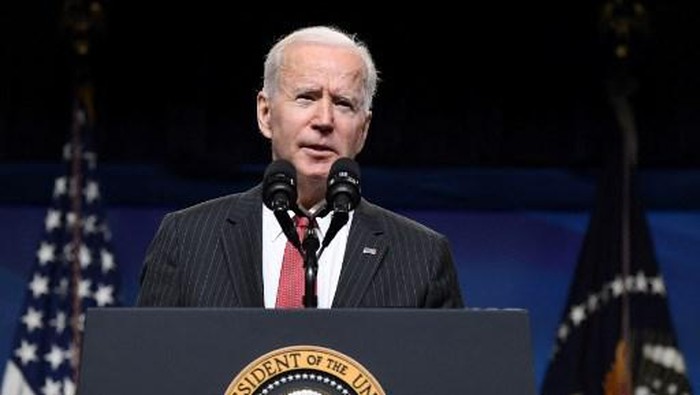
US President Joe Biden announced sanctions Wednesday against Myanmar's military leaders and demanded they relinquish power, after tens of thousands of people took to the streets of the Southeast Asian nation's biggest city for a fifth consecutive day demanding a return to democracy.
The popular show of force in Yangon, which came in defiance of a protest ban in Myanmar's former capital, saw crowds swarm through the city and call for the release of Aung San Suu Kyi following her ouster in a coup last week.
Protesters faced down police a day after authorities dispersed crowds elsewhere with tear gas and rubber bullets, and ramped up their harassment of the deposed leader's party.
The sudden escalation of force against demonstrations sweeping the country prompted a fresh chorus of international condemnation after officers fired live rounds at one rally in Naypyidaw, which has been the capital since 2005.
Biden said his administration was cutting off Myanmar generals' access to $1 billion in funds in the US and would soon unveil new sanctions.
"I again call on the Burmese military to immediately release democratic political leaders and activists they are now detaining including Aung San Suu Kyi and also Win Myint, the president," Biden said.
"The military must relinquish power."
Two people were critically wounded in the Naypyidaw incident -- including one woman who was shot in the head.
Images depicting her in the moments after she was shot were by Wednesday appearing on a huge protest banner and had been widely shared online alongside expressions of grief and fury.
"They can shoot a young woman but they can't steal the hope and resolve of a determined people," UN special rapporteur Tom Andrews tweeted Wednesday.
Massive crowds returned to the streets of Yangon Wednesday, where the day before they had faced off against a phalanx of riot police standing alongside water cannon trucks near Suu Kyi's residence.
Biden's remarks come after European Union foreign policy chief Josep Borrell warned the bloc could impose fresh sanctions on Myanmar's military, but said any measures should be targeted to avoid hitting the wider population.
Biden said the US would "work with our international partners to urge other nations to join us in these efforts."
Journalist detained
More politicians from Suu Kyi's National League for Democracy (NLD) were detained Tuesday along with 30 others -- including a journalist from local broadcaster DVB -- at a protest in Mandalay, the Assistance Association for Political Prisoners monitoring group said.
Their arrests in Yangon came as police fired tear gas at protesters who were waving red NLD flags.
State media reported the crowd had thrown objects at police and injured four officers -- its first direct mention of the protests since they began on the weekend.
"Therefore, the police members dispersed in accordance with the methods and laws," the state-run Global New Light of Myanmar newspaper reported, without mentioning other police confrontations elsewhere in the country.
Hundreds of protesters in Mandalay were undeterred Wednesday, returning to the streets carrying signs that said "Down with dictatorship".
Elsewhere, the discipline of security forces appeared to be breaking down, with four officers defecting from their lines in the eastern town of Loikaw to join the anti-coup protests, according to local media reports.
Soldiers raided NLD headquarters in Yangon after night fell, but party member Soe Win told AFP that his colleagues had been prevented from intervening due to a blanket curfew imposed on the city.
The following morning he arrived on the scene to find door locks broken, computer equipment missing, server cables cut and bank documents taken from a safe box.
'Respect the vote'
The military justified last week's power grab by claiming widespread voter fraud in the November polls, which saw a landslide for Suu Kyi's party.
It quickly moved to stack courts and political offices with loyalists.
In the 10 days since army chief Min Aung Hlaing ousted the Nobel laureate from power and ended a decade of civilian rule, Myanmar has been roiled by a burgeoning civil disobedience campaign and massive street protests.
Medical staff, air traffic controllers and teachers have staged strikes, while others have fastened red ribbons on their uniforms or posed for photos while brandishing the three-finger salute adopted by the anti-coup movement.
By Wednesday, the military announced that special hotlines have been set up for civil servants to report if they were being bullied for not participating in anti-coup activities.
A tech-focused Myanmar civil society organisation also tweeted that a draft cyber security bill had been sent to telecoms companies -- which last week were ordered to briefly shut down internet services.
According to MIDO, the bill will allow the military to "order shutdowns, website bans, content take downs and interceptions", while also requiring social media platforms to hand over users' metadata to authorities upon request.
The UN Human Rights Council has said it would hold a special session on Friday to discuss the crisis.

